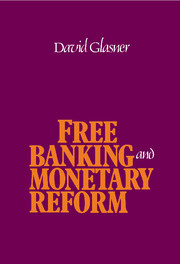Book contents
- Frontmatter
- Contents
- Preface
- Acknowledgments
- PART I A THEORY OF MONETARY INSTITUTIONS
- PART II THE UNCERTAIN PROGRESS OF MONETARY THEORY AND MONETARY REFORM
- 3 The classical theory of money
- 4 The quantity theory of money
- 5 The heyday of the gold standard, 1879–1914
- 6 The Great War, the Great Depression, and the gold standard
- 7 The Keynesian revolution and the Monetarist counterrevolution
- PART III A COMPETITIVE MONETARY REGIME
- References
- Index
3 - The classical theory of money
Published online by Cambridge University Press: 16 September 2009
- Frontmatter
- Contents
- Preface
- Acknowledgments
- PART I A THEORY OF MONETARY INSTITUTIONS
- PART II THE UNCERTAIN PROGRESS OF MONETARY THEORY AND MONETARY REFORM
- 3 The classical theory of money
- 4 The quantity theory of money
- 5 The heyday of the gold standard, 1879–1914
- 6 The Great War, the Great Depression, and the gold standard
- 7 The Keynesian revolution and the Monetarist counterrevolution
- PART III A COMPETITIVE MONETARY REGIME
- References
- Index
Summary
The late multiplication of banking companies in both parts of the united kingdom, an event by which many people have been much alarmed, instead of diminishing, increases the security of the public. It obliges all of them to be more circumspect in their conduct, and, by not extending their currency beyond its due proportion to their cash, to guard themselves against those malicious runs, which the rivalship of so many competitors is ready to bring upon them. … This free competition too obliges all bankers to be more liberal in their dealings with their customers, lest their rivals should carry them away. In general, if any branch of trade, or any division of labour, be advantageous to the public, the freer and more general the competition, it will always be the more so.
Adam Smith, The Wealth of NationsThe conventional explanation for suppressing competition in the supply of money is that competition increases the supply and reduces the price of whatever competitors are supplying. For most goods this a great benefit. But unlike the physical services generated by, say, a refrigerator, which do not depend on how much, or how little, the refrigerator is worth, monetary services would vanish if money lost its value. Cheapening an ordinary good does not destroy the physical attributes that make it desirable.
- Type
- Chapter
- Information
- Free Banking and Monetary Reform , pp. 49 - 68Publisher: Cambridge University PressPrint publication year: 1989



